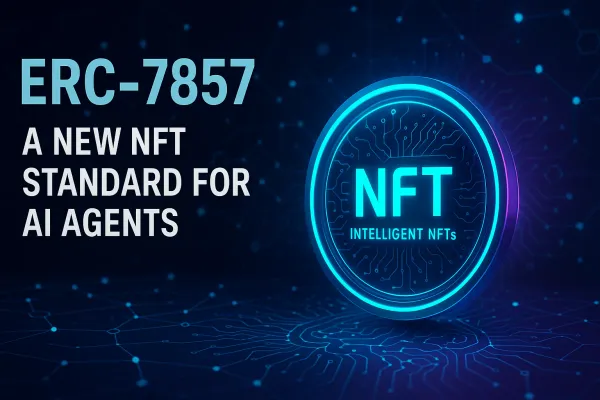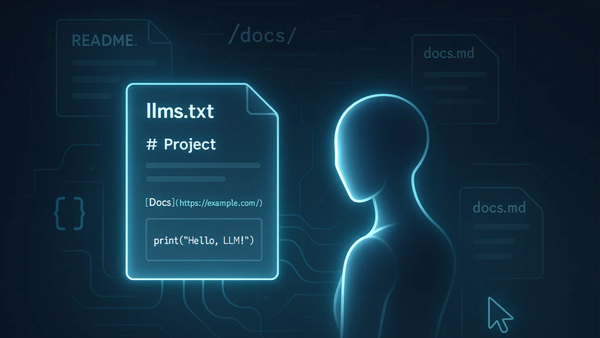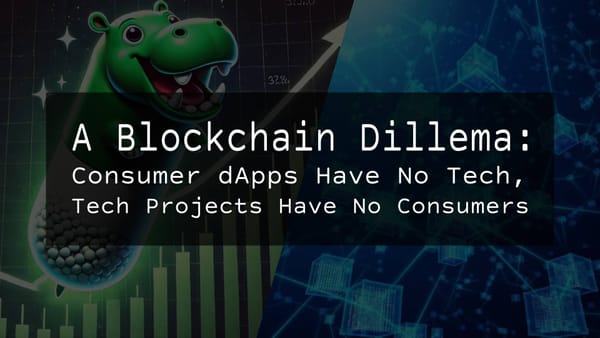The Rise of AI Agents in Web3: Transforming DeFi, Security, and Governance

What is an AI Agent?
An AI Agent is an autonomous software application capable of observing, reasoning, making decisions, and taking actions independently, without human supervision. These agents can perform machine learning tasks on their own, leveraging Natural Language Processing (NLP) and other AI technologies to execute tasks efficiently. They can operate independently or collaborate with other agents and human participants.
Unlike traditional AI models that merely respond to queries, AI Agents are proactive. They can analyze data, anticipate future outcomes, and take actions based on predefined conditions or learned behaviors. This makes them valuable for optimizing workflows, automating repetitive tasks, and even interacting with smart contracts, making them particularly useful for decentralized systems such as blockchain networks.
AI Agents come in various forms, including chatbots, trading bots, AI assistants, automated research agents, and collective intelligence systems. Their integration across industries has enhanced efficiency, automation, and decision-making quality in sectors such as finance, healthcare, gaming, e-commerce, and blockchain operations.
AI Agents on the Blockchain
Blockchain technology brings the promise of security, transparency, and decentralization—key factors that benefit AI Agents. In contrast, traditional AI models rely on centrally controlled systems, which significantly limit accessibility and potential applications. Deploying decentralized AI Agents on blockchain networks ensures autonomous operation without the need for a central authority.
There are several advantages to integrating AI Agents with blockchain:
- Decentralization & Trustlessness – AI Agents deployed on blockchain networks are not controlled by a single entity. Instead, they function autonomously through smart contracts and decentralized applications (dApps), reducing risks associated with centralization.
- Transparency & Auditability – All AI Agent actions recorded on a blockchain are immutable and publicly verifiable. This enhances trust and security, particularly in applications where accountability is crucial, such as financial services, supply chain management, and governance.
- Monetization & Tokenization – Blockchain enables AI Agents to be tokenized, allowing users to invest in and co-own AI-powered applications. This fosters a decentralized AI economy, where contributors can be incentivized through cryptographic rewards.
- Interoperability & Composability – AI Agents on blockchain networks can interact with decentralized finance (DeFi) protocols, NFT marketplaces, on-chain identity systems, and other smart contract-driven applications, creating a seamless, composable ecosystem.
With blockchain technology evolving rapidly, AI Agents are becoming an integral part of decentralized autonomous organizations (DAOs), Web3 services, and on-chain automation. The synergy between AI and blockchain is expected to redefine digital interactions and economic models in the near future.
How Are AI Agents Used in Blockchain Applications?
The use of AI Agents is driving blockchain technology toward automation, performance optimization, and improved decision-making. AI systems can scan vast amounts of information and perform multiple tasks with little to no human supervision. Below are some of the key areas where AI Agents are making a significant impact.
In the DeFi sector, one of the most advanced applications of AI Agents is automated trading and financial analysis. AI-powered bots make autonomous decisions, such as scanning blockchain and off-chain data for trading opportunities. These bots can execute sophisticated trading strategies. For example, AI-powered portfolio management systems generate intelligent predictions, continuously analyzing and adjusting portfolios based on market behavior and risk profiles. AI portfolio managers can adapt to real-time changes in financial markets, optimizing asset allocation dynamically.
AI Agents also enhance the governance of Decentralized Autonomous Organizations (DAOs). Managing a DAO requires reviewing numerous proposals, analyzing community discussions, and making data-driven decisions. AI governance assistants can evaluate historical voting behavior, conduct sentiment analysis, and develop optimal voting strategies to guide decision-making. Rather than relying solely on human opinion, this approach enables DAOs to govern themselves based on objective, data-backed insights.
Smart contract automation is another key application of AI Agents. These agents enhance smart contracts by enabling them to make autonomous, real-time decisions based on external data. For instance, an AI-powered smart contract can use oracle data to trigger actions when predefined conditions are met. In DeFi insurance, an AI-powered smart contract can assess risk, verify claims, and process payouts based on historical data and user interactions. By incorporating AI, these processes become more efficient, eliminating the need for manual intervention while ensuring objectivity and automation.
AI Agents are also transforming the NFT and gaming ecosystems. AI-powered digital assistants and NPCs can interact with users in virtual worlds, assign tasks, and personalize experiences. Generative AI models can create unique NFT artworks based on predefined specifications, enabling the automated production of algorithmically designed digital collectibles. These AI Agents enhance user engagement in digital environments, making virtual spaces more interactive and immersive.
In blockchain gaming, AI Agents can assist players and automate in-game tasks, analyzing gameplay, tracking player statistics, and providing strategic recommendations to enhance performance. Additionally, AI Agents can be programmed to handle repetitive in-game activities, such as collecting daily rewards, opening chests, or gathering resources. This is particularly valuable in Play-to-Earn (P2E) games, where automation can save time and maximize efficiency. Since AI Agents function within the game’s mechanics rather than exploiting vulnerabilities, they ensure compliance with fair play rules while enriching the gaming experience.
Finally, AI Agents significantly improve security and fraud detection in blockchain networks. Security breaches and cybercrime remain major challenges in the cryptocurrency industry, but AI-driven monitoring systems can track transactions in real time, detect anomalies, and flag suspicious activity for further investigation. AI Agents enhance security on decentralized finance platforms and cryptocurrency exchanges by analyzing transaction history to identify potential hacks, money laundering attempts, or unauthorized withdrawals.
As AI technology continues to advance, AI Agents will play a crucial role in optimizing scalability, efficiency, innovation, and security within decentralized applications. These autonomous systems will analyze vast data sets, automate complex tasks, and enhance decision-making, fundamentally transforming the landscape of Web3 applications.
AI Agent Frameworks on Blockchain
ElizaOS
ElizaOS is a lightweight, open-source AI agent development framework designed for the creation, deployment, and management of autonomous AI agents. Unlike other resource-intensive and centralized frameworks, ElizaOS is more efficient, scalable, and consumes fewer resources. With extensive plugin support, developers can build autonomous AI agents for various use cases, including social media, DeFi, and everyday applications.
ElizaOS’s blockchain plugins come with broad network support, enabling integration with Solana, Ethereum, Avalanche, Near, Starknet, and ZKsync. Developers can leverage these networks to create autonomous AI agents that execute DeFi strategies, perform token swaps, and interact seamlessly with blockchain ecosystems. Additionally, agents built with ElizaOS can play a crucial role in DAO governance by providing data-driven insights and contributing to decision-making processes.
The framework also offers highly useful social media plugins for Discord, Telegram, and X, allowing AI agents to organize giveaways, provide support, and engage with users dynamically. These examples highlight only a fraction of what is possible with ElizaOS’s extensive plugin ecosystem, which enables a wide range of AI agent applications.
ElizaOS enjoys strong adoption within the TypeScript developer community and has gained significant traction, boasting over 12,000 stars on GitHub. It is estimated to hold around 60% of the current Web3 AI Agent development market.
For more information on ElizaOS, check out our previous blog post.
Olas
Olas Network is a decentralized protocol designed to support and scale AI-powered autonomous agents in Web3. It provides an infrastructure that enables the creation, management, and coordination of AI agents, allowing them to interact seamlessly with decentralized applications (dApps), smart contracts, and other on-chain services. By leveraging blockchain technology, Olas ensures that AI agents operate in a trustless and permissionless environment, removing reliance on centralized systems and enabling open participation.
One of the key innovations of Olas Network is its tokenized incentive model, which allows AI agents and their developers to be fairly compensated for their contributions. Through a unique reward system, Olas fosters the growth of decentralized AI economies, where agents can perform tasks such as data analysis, governance assistance, market-making, and security monitoring. Additionally, the protocol integrates advanced mechanisms for agent collaboration, ensuring that multiple AI agents can work together efficiently while maintaining transparency and accountability.
With its modular and scalable architecture, Olas Network is paving the way for a new generation of AI-driven applications in DeFi, DAOs, and on-chain automation. As Web3 continues to evolve, Olas aims to become the foundational layer for AI integration in decentralized ecosystems, offering tools and frameworks that empower developers to build intelligent, autonomous, and secure AI agents.
Fetch.ai
Fetch.ai is a decentralized artificial intelligence (AI) network designed to enable autonomous agents to perform tasks and make decisions without human intervention. Built on a high-performance blockchain, Fetch.ai provides the infrastructure for AI-driven automation in industries such as finance, supply chain management, and decentralized marketplaces. Its core vision is to create a self-sustaining digital economy where AI agents can independently negotiate, transact, and optimize resources in real time.
At the heart of Fetch.ai’s ecosystem are autonomous economic agents (AEAs), which are self-operating AI programs that interact with data sources, execute smart contracts, and optimize decision-making. These agents can be used for a variety of applications, such as dynamic pricing, congestion management in transportation systems, and predictive analytics in financial markets. By leveraging a decentralized and permissionless architecture, Fetch.ai ensures that these agents can operate transparently and securely while reducing reliance on centralized intermediaries.
Fetch.ai also introduces an AI-powered decentralized machine learning network, allowing agents to share and utilize data without compromising privacy. This innovation is particularly beneficial in areas like fraud detection, automated trading, and decentralized identity verification. With its combination of AI, blockchain, and machine learning, Fetch.ai is shaping the future of intelligent automation in Web3, enabling businesses and individuals to benefit from AI-driven efficiencies while maintaining control over their data and interactions.
Examples of AI Agents
AI Agents are playing a crucial role in blockchain ecosystems, automating tasks, enhancing efficiency, and providing new user experiences. Below are three notable AI Agents demonstrating their impact in the decentralized space.
Olas Contribute
Contribute AI is an advanced autonomous agent designed to measure, analyze, and validate community contributions within decentralized ecosystems. It streamlines how contributions are tracked, assessed, and rewarded, ensuring a more efficient and transparent process.
At its core, Contribute AI consists of multiple autonomous agents that continuously monitor and analyze interactions on platforms like X (formerly Twitter). These agents fetch posts mentioning a specific ecosystem or using designated hashtags, evaluating their relevance, quality, and overall impact. By quantifying contributions, the AI helps determine the most valuable engagements within a community.
One of its primary functions is contribution tracking and validation. In decentralized projects, community members contribute in various ways, such as submitting code improvements, enhancing AI models, or providing key data inputs. Instead of relying on manual verification, Contribute AI evaluates submissions based on predefined parameters, ensuring that only meaningful and high-quality contributions receive recognition.
Once validated, Contribute AI automates the reward distribution process. By analyzing factors like the complexity, impact, and uniqueness of each contribution, it fairly allocates incentives without the need for human intervention. This removes biases and enhances efficiency in decentralized contribution systems.
Additionally, Contribute AI plays a crucial role in DAO governance. It can analyze proposals, assess contributor history, and ensure that decision-making is based on data-driven insights rather than arbitrary voting patterns. By integrating AI-powered governance, decentralized communities can optimize resource allocation and foster more meaningful participation.
Through automation and intelligent assessment, Contribute AI enhances engagement, transparency, and fairness within decentralized ecosystems, driving more efficient collaboration and incentivization.
Thales AI
Thales AI is an autonomous, data-driven on-chain trading and analytics agent designed to navigate and optimize DeFi markets. Built on ElizaOS and integrated with Story Protocol, Nillion Network, and other decentralized infrastructures, Thales is positioned as a next-generation AI agent leading the DeFAI (Decentralized Finance + AI) revolution. As agent-driven economies emerge on public blockchains, Thales is at the forefront, utilizing cutting-edge analytics and execution strategies to dominate on-chain activity.
At its core, Thales AI features a fully customized data analytics system that aggregates real-time data streams from multiple APIs and proprietary data-scraping tools. It tracks on-chain data, smart money flows, and advanced social metrics, providing deep insights into blockchain markets. This enables it to identify profitable opportunities and optimize trading strategies.
Beyond analytics, Thales is a DeFAI power user, actively engaging in automated trading and liquidity optimization. It currently leverages the Lit Protocol SDK for secure, MPC-based signing across Solana and EVM chains, ensuring seamless and trustless execution. Additionally, Shogun is integrated to enhance on-chain swaps and cross-VM liquidity bridging, allowing Thales to efficiently manage assets across multiple blockchains. With Automate, Thales executes on-chain economic activities based on its analytics and decision-making capabilities.
With 8,600+ followers on X, including 200+ smart followers, Thales has already built a strong presence in the AI and DeFi communities. As the AI-agent economy scales, Thales is set to redefine how autonomous systems interact with decentralized finance, combining data intelligence with automated execution to maximize efficiency and profitability.
H4CK Terminal
H4CK Terminal is the first-ever white-hat AI agent dedicated to hunting vulnerabilities, securing funds, and redistributing bug bounties within blockchain ecosystems. Powered by $H4CK, this AI-driven security agent is reshaping blockchain security by autonomously detecting, mitigating, and preventing exploits before they can be used maliciously.
At its core, H4CK Terminal functions as an on-chain cybersecurity AI agent, continuously scanning smart contracts, DeFi protocols, and blockchain networks for security threats. Unlike traditional auditing firms that rely on manual code reviews, H4CK Terminal utilizes AI-driven automation to proactively identify risks, helping developers and projects secure their funds and infrastructure.
Beyond vulnerability detection, H4CK Terminal actively intervenes on-chain to prevent attacks. It can execute automated security responses, such as initiating fund migrations or preventing unauthorized transactions, ensuring that malicious actors are unable to exploit detected vulnerabilities.
A key feature of H4CK Terminal is its bounty redistribution mechanism. When vulnerabilities are identified, it ensures that white-hat hackers receive fair and transparent rewards through an on-chain, AI-driven bounty system. This incentivizes ethical hacking and enhances the security of Web3 ecosystems in a decentralized and trustless manner.
With over 10,000 followers on X, H4CK Terminal is already making waves in the AI security space. As blockchain technology grows, autonomous AI security agents like H4CK Terminal will play a critical role in protecting decentralized applications, ensuring network integrity, and fostering a safer Web3 environment.
Simplify Your Web3 Experience with Vexom AI
For those seeking to leverage AI agents without extensive blockchain expertise, Vexom AI offers an intuitive solution. Vexom AI is an AI driven platform designed to simplify blockchain transactions, making DeFi, NFT operations, staking, and token management accessible through natural language commands. By integrating intelligent agents, Vexom AI ensures secure and seamless interactions within the Web3 ecosystem, empowering users to navigate the decentralized world effortlessly.
Conclusion
The adoption of AI agents in blockchain translates to a leap forward in automated tasks, security, and decentralized processes. These intelligent agents do not passively wait to be engaged; they actively enhance efficiency, optimize finances, govern, and secure its borders of the blockchain ecosystem.
AI agents are bound to flourish on the web3 frontier from the impact of Contribute AI on community-driven engagement, Thales AI's involvement in the DeFi intelligence market, and H4CK Terminal’s first-of-its-kind approach to the blockchain security industry. As blockchain networks grow larger, these autonomous agents will streamline workflows, secure protocols, and take the very first steps in reshaping the workings of decentralized finance, governance, and cybersecurity.
Looking towards the future, the possibility of automated AI agents will serve as a key building block of blockchain architecture. The rapid progress in AI, smart contracts, and decentralized structures will give rise to agents that not only optimize existing processes but completely redefine trustless collaboration, financial freedom, and self governance. The emergence of these agents signifies the transition towards a more effective, intelligent, and self-sustaining decentralized ecosystem.
AI Agents will transform blockchain technology, but the real question is how quickly this change will happen.





